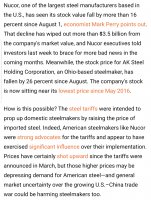LouderVol
Extra and Terrestrial
- Joined
- May 19, 2014
- Messages
- 51,178
- Likes
- 49,099
yes and? should the government be mandating their prices? If they are dumb enough to do that and hurt themselves, by keeping the competition competitive they can go for. government interference got us here, should more be trusted to fix it?You would think the tarrifs wold have made US steel more competitive. US steel just took it as an opportunity to raise prices.



